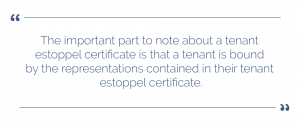Are there any risks of signing a tenant estoppel certificate that are worth knowing or noting? As we have discussed in previous posts, a tenant estoppel certificate is a certification regarding the status of the tenancy. In this post, we’ll be discussing the risks of signing a tenant estoppel certificate.
What is The Purpose of a Tenant Estoppel Certificate
The purpose of a tenant estoppel certificate is for the tenant to certify certain basic information regarding the terms of the lease. This information usually includes, but is not limited to, the date of the lease, the parties to the lease, any amendments to the lease, the lease commencement and termination dates, whether the tenant has any rights of first refusal or options to purchase the property or lease additional space, whether the landlord is in default under the lease, the amount of the security deposits, and the amount of rent.

A tenant estoppel certificate usually comes into play when the landlord or the owner of the property seeks to refinance or sell the subject property. This is because simply reviewing the lease and a rent roll may not reveal the whole story regarding the status of the tenancy.
For example, the lease may state that the rent is one price, but perhaps the landlord and tenant agreed that the rent is another price pursuant to an oral amendment. Or, as another example, the lease and rent roll would not reveal that the tenant contends landlord failed to compete certain required repairs at the premises.
The important part to note about a tenant estoppel certificate is that a tenant is bound by the representations contained in their tenant estoppel certificate.
This allows a buyer or lender to rely on the representations contained in the certificate so that the tenant cannot later claim the terms are otherwise.
Indeed, most lenders or buyers of real property require the seller to provide a tenant estoppel certificate to minimize or prevent post-transaction surprises that might adversely affect the value of the property.
Risks of Signing a Tenant Estoppel Certificate
In light of the foregoing, if a tenant signs a tenant estoppel certificate, the tenant should understand that it will be bound by whatever representations are in there. Thus, there is a risk for the tenant if the tenant does not accurately provide accurate or complete information.
There is also a risk for the tenant if the tenant fails to identify potential breaches or defaults by the landlord because in the future, the tenant may be estopped from claiming a breach or default that existed as of the date of the certificate.
Risks of Not Signing an Estoppel Certificate
However, often, the risk of not signing a tenant estoppel certificate may be worse than if the tenant signs ones. This is because most commercial leases require a tenant to provide a tenant estoppel certificate upon request for specific purposes within a specific time or a tenant may bedeemed to be bound by whatever the landlord puts in the certificate, which forecloses the tenant’s opportunity to later dispute terms and issues with the lease. Moreover, failing to sign atenant estoppel certificate can be a basis for eviction.
Schorr Law, APC has experience addressing all types of commercial leasing issues, including issues related to tenant estoppel certificates. To schedule a consultation with one of our attorneys, you can call us directly at (310) 954-1877, text us at (310) 706-2265, or send us a message here.



